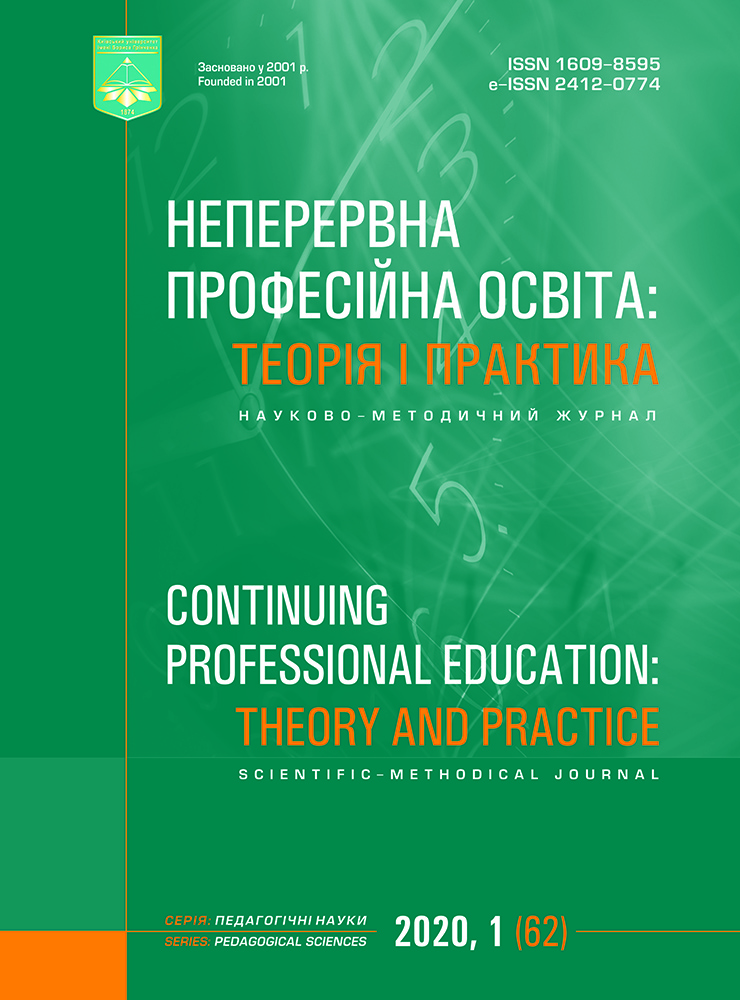QUALITY OF EDUCATION IN THE EUROPEAN UNION STRATEGIC DOCUMENTS: A CRITICAL ANALYSIS
DOI:
https://doi.org/10.28925/1609-8595.2020.1.13Keywords:
critical educational theory, education, EU strategic documents, market mechanisms in the education area, quality of educationAbstract
The internationalization of the market coincided with the opening of state borders for the benefit of free movement of capital, goods, labor, services and information. With the dominance of the ideological realm of economic pragmatism, educational discourse is overwhelmed and dominated by conceptual loans from the business world: choice, competition, efficiency, speech, management, productivity, consumer. Thus, a successful criterion of international economic competition emerges as a key quality criterion. The Communication from the Commission of the European Communities (2008) on an updated strategic framework for European cooperation in education and training raises the need for upgrading the skills of the population and the need to implement skills development policies that better respond to current and future needs of the labor market. However, the entrepreneurial spirit promoted at all levels of education and training rather establishes a more modern surveillance mechanism by establishing a cultural arbitrary accord with the market economy (Foucault, 2005). Consequently, it is necessary to find an alternative way of teaching that welcomes the questioning and manifestation of both the genetic cause and the prospects behind the formal education policy.References
Apple, M. (2001). Educating the «right» way. Markets, standards, god, and inequality. Routledge.
Aronowitz, S. (1996). National standards would not change our cultural capital. Clearing House, 69 (3), 144–148.
Bottcher, W. (2002). Kann eine okonomische Schule auch eine padagogische sein? Schulentwicklung zwischen Neuer Steuerung, Organisation, Leistungsevaluation und Bildung. Juventa Verlag.
Haas, G. (1977). Curriculum planning: A new approach. Ally nana Bacon Inc.
Handy, C. (1995). The Empty Raincoat; Making Sense of the Future. Arrow Business Books.
Harvey, L., Bowers-Brown & Leman, J. (2003). External quality evaluation: Findings of the web survey conducted in October 2003. Centre for Research and Evaluation.
Morley, L. (2005). The Micropolitics of quality. Critical Quarters, 47 (1–2), 83–95. https://doi.org/10.1111/ j.0011-1562.2005.00616.x.
Reich, R. (1991). The Work of Nations. A blueprint for the Future. Vintage.
Schweizer, H. M. (1988). Vorbemerkungen zu einer Theorie der Erziehung. In G. Schneider (ed.), Asthetiche Erziehung der Grundschule (SS. 157–181). Weinheim und Basel.
Warde, A. (1996). The Effects of the 1992 Research Assessment Exercise. Network: Newsletter of the British Sociological Association, 64, 1–2.
Adorno, T. (2000). Θεωρία της ημιμόρφωσης. (Λ. Αναγνώστου, μετάφρ.). Αλεξάνδρεια.
Βαβούρας, Ι. (2001). Υπαγωγή της εκπαίδευσης στους νόμους της αγοράς. Θέματα Παιδείας, 6, 20–21.
Γκότοβος, Α. (2002). Εκπαίδευση και ετερότητα. Ζητήματα διαπολιτισμικής παιδαγωγικής. Μεταίχμιο.
Δαφέρμος, Ο. (2001). Το σχολείο στην εποχή της γνώσης και των μεταβολών. Νέα Παιδεία, 97, 21–26.
Επιτροπή των Ευρωπαϊκών Κοινοτήτων (2008). Ένα επικαιροποιημένο στρατηγικό πλαίσιο για την ευρωπαϊκή συνεργασία στην εκπαίδευση και την κατάρτιση. COM (2008) 865 τελικό, 16.12.2008. http://eur-lex.europa.eu/LexUriServ/
LexUriServ.do?uri=COM:2008:0865:FIN:EL:PDF.
Faltin, G. και Zimmer, J. (2004). Τα μικρά ψάρια είναι ευέλικτα: Επαναπροσδιορισμός του όρου «Αγορά» και ο ρόλος της εκπαίδευσης. Τυπωθήτω Δάρδανος.
Foucault, M. (2005). Επιτήρηση και Τιμωρία: Η γέννηση της φυλακής. Ράππας.
Ζεμπύλας, Μ. (2009). Εκπαιδευτική Πολιτική και Αναλυτικά Προγράμματα. Αναλυτικά προγράμματα: Θεωρίες και εφαρμογές. Τ. Β. ΑΠΚΥ.
Ζεμπύλας, Μ., Πέτρου, Α., Παπαστεφάνου, Μ. (2008). Εκπαιδευτική Πολιτική και Αναλυτικά Προγράμματα. Τ. Α. ΑΠΚΥ.
Ζμάς, Α. (2007). Παγκοσμιοποίηση και εκπαιδευτική πολιτική. Μεταίχμιο.
Held, D. & Mc Grew, A. (2004). Παγκοσμιοποίηση – Αντι-παγκοσμιοποίηση. (Κ. Κιτίδη, μετάφρ.). Θεωρία – Ιδέες. Πολύτροπον.
Lyotard, J. F. (1988). Η μεταμοντέρνα κατάσταση. (Κ. Παπαγιώργης, μετάφρ.). Γνώση.
Ματθαίου, Δ. (2001). Το Πανεπιστήμιο στην εποχή της ύστερης νεωτερικότητας, Συγκριτική μελέτη της ιδεολογικής και θεσμικής μεταλλαγής του. Ε.Σ.ΠΑΙ.Δ.Ε.Π.Ε.
Ματθαίου, Δ. (2006). Το σχολείο στην εποχή της αμφισβήτησης του κανόνα. Η γνώση ανάμεσα στις συμπληγάδες της πληροφορίας και της πολυπολιτισμικότητας. Στο Δ. Χατζηδήμου και Χρ. Βιτσιλάκη (επ.), Το σχολείο στην κοινωνία της πληροφορίας και της πολυπολιτισμικότητας (σσ.: 1035–1044). Αφοί Κυριακίδη.
Ματθαίου, Δ. (ά.χ.). Ποιότητα στην εκπαίδευση. Ιδεολογικές ορίζουσες, εννοιολογήσεις και πολιτικές. Μια συγκριτική θεώρηση. Εθνικό και Καποδιστριακό Πανεπιστήμιο Αθηνών.
Πέτρου, Α. & Ζεμπύλας, Μ. (2009). Για μια ριζοσπαστική κριτική των εθνικών επιπέδων στα Αναλυτικά Προγράμματα: Οι θεωρήσεις των Freire και Foucault και η περίπτωση της Κύπρο. ΙΓ΄ Διεθνές Συνέδριο Παιδαγωγικής Εταιρείας Ελλάδας, Ιωάννινα.
Φρέϊρε, Π. (1977). Η αγωγή του καταπιεζόμενου. (Γ. Κρητικός, μετάφρ.). Ράππα.
Downloads
Published
How to Cite
Issue
Section
License
Copyright (c) 2020 Georgios Pappas

This work is licensed under a Creative Commons Attribution-NonCommercial 3.0 Unported License.



